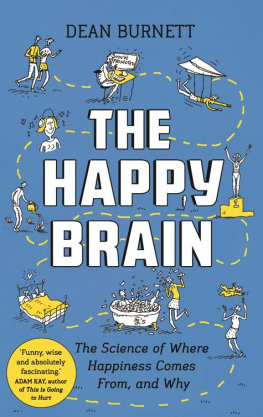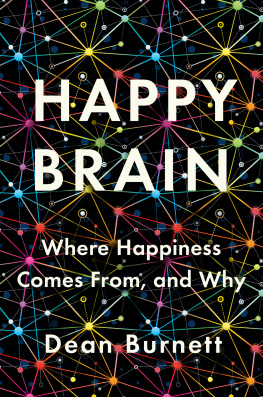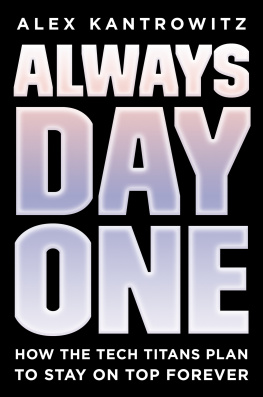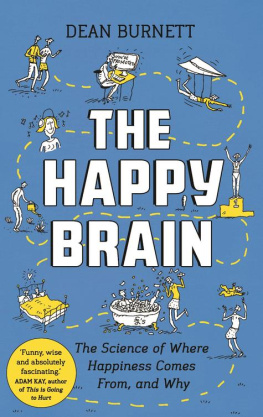YOUR
HAPPINESS
WAS
HACKED
WHY TECH IS WINNING THE BATTLE TO CONTROL YOUR BRAIN, AND HOW TO FIGHT BACK
VIVEK WADHWA AND ALEX SALKEVER

Your Happiness Was Hacked
Copyright 2018 by Vivek Wadhwa and Alex Salkever
All rights reserved. No part of this publication may be reproduced, distributed, or transmitted in any form or by any means, including photocopying, recording, or other electronic or mechanical methods, without the prior written permission of the publisher, except in the case of brief quotations embodied in critical reviews and certain other noncommercial uses permitted by copyright law. For permission requests, write to the publisher, addressed Attention: Permissions Coordinator, at the address below.

| Berrett-Koehler Publishers, Inc.
1333 Broadway, Suite 1000
Oakland, CA 94612-1921
Tel: (510) 817-2277, Fax: (510) 817-2278
www.bkconnection.com |
Ordering information for print editions
Quantity sales. Special discounts are available on quantity purchases by corporations, associations, and others. For details, contact the Special Sales Department at the Berrett-Koehler address above.
Individual sales. Berrett-Koehler publications are available through most bookstores. They can also be ordered directly from Berrett-Koehler: Tel: (800) 929-2929; Fax: (802) 864-7626; www.bkconnection.com
Orders for college textbook/course adoption use. Please contact Berrett-Koehler: Tel: (800) 929-2929; Fax: (802) 864-7626.
Distributed to the U.S. trade and internationally by Penguin Random House Publisher Services.
Berrett-Koehler and the BK logo are registered trademarks of Berrett-Koehler Publishers, Inc.
First Edition
Hardcover print edition ISBN 978-1-5230-9584-1
PDF e-book ISBN 978-1-5230-9585-8
IDPF e-book ISBN 978-1-5230-9586-5
2018-1
Book produced by BookMatters; copyedited by Mike Mollett; proofread by Janet Reed Blake; indexed by Leonard Rosenbaum.
Cover designed by Rob Johnson, Toprotype, Inc.
CONTENTS
This book is dedicated to our editor Neal Maillet and to his late son Aaron Cooper Maillet, who passed away in a tragic accident just as this book was going to press. There is no easy way to come to terms with such a profound loss. May time bring Neal, Jacqueline, Brenna, and Hilary a measure of healing and comfort.
FOREWORD
I have been a professional technology investor since 1982, which has given me a front-row seat at the creation of the most exciting industries of the past thirty-five years, including personal computers, cellular phones, the Internet, and social networking. I was a mentor to Mark Zuckerberg during the early years of Facebook and at one time was a vocal advocate for the platform. I still love the Facebook service, but I believe that the companys advertising business model has created social, economic, and political damage that demands a national conversation, and possibly intervention. And Facebook is not alone: the problem is endemic to Google, Snapchat, Twitter, Slack, and most of the other major Internet platforms.
Internet platforms have revolutionized our lives, but only now are we beginning to see their dark side. Millions of adults lose productivity, sleep, and motivation through constant interruptions by technology that was supposed to make them more productive. There has been widespread coverage of the way Russian hackers exploited Facebooks architecture to interfere in the U.S. presidential election of 2016. Less well known is the way that use of Facebook influenced the vote on Brexit in the U.K., as well as other recent elections in Europe. There is mounting evidence that Facebook is also being exploited by allies of the government in Myanmar to make genocide of the Rohingya minority acceptable to that countrys population. In the U.S., Facebooks advertising tools enable illegal discrimination in housing and violate the civil rights of innocent people. The Internet platforms themselves are particularly dangerous for children, who do not have tools to protect themselves. Snapchat Streaks and similar products on other platforms substitute addictive activities for the human interaction that is so fundamental to the emotional well-being of children. On top of that, lack of vigilance by the platforms has resulted in millions of children being exposed to inappropriate content.
The good aspects of Internet platforms are now being offset by flaws that are invisible to most users. All of this is possible because Facebook, Google, and other Internet platforms consciously addict their users in order to make their products and advertising more valuable. They combine propaganda techniques initially developed by the U.K. government in World War I with addiction strategies perfected by the gambling industry. They deliver two billion individually personalized channels on smartphones, the first media-delivery platform that is available to users every waking moment. The Internet platforms give users what they want, creating filter bubbles that reinforce pre-existing beliefs in ways that make those beliefs more extreme and inflexible, causing many users to reject new information and even evidence.
It is ironic that tech platforms have joined illegal drug dealers in calling their consumers users. As are many illegal drug users, technology platform users are addicted. Too many have lost control over their lives. Too many cannot help themselves, because they either dont know they are addicted or dont have the tools with which to break the addiction. At present, there is no organized effort to help them.
A handful of Silicon Valley leadersmostly people like me who had once been involved with Facebook or Googlerecognized this problem in 2016 and 2017, and started to speak out. Meanwhile, the founders and CEOs of many major technology companies limit use of these products by their children, even as they promote unrestricted use by everyone else. Similarly, the platforms talk about privacy but take every step imaginable to invade the privacy of their users. They talk about connecting people, but their products actually increase polarization, isolation, and loneliness.
We are at a crossroads. In 2016, the tech industry could reasonably claim to be unaware of the problems pervading advertising-supported Internet platforms. That is no longer the case. Policy makers in Washington and around the world increasingly recognize that the promise of always-on technology has given way to a dystopian present. The time has come for users to get involved and to push back on platforms that are causing them harm in the pursuit of profits.
Your Happiness Was Hacked is a really important and timely book. Not only is it the first on this topic by people who have spent their careers in the tech industry, but it also combines analysis of the problem with thoughtful prescriptions. It will not be easy to fix what is wrong with the major Internet platforms and our relationship to them, but the first step is to present the facts and foster a conversation about where to go from here. Vivek and Alex have taken that critical first step. They have surveyed the pioneering work being done by my partner Tristan Harris, by James Williams, and by many others, and distilled it into the book you are reading. There will be many more books about this issue, but this a great place to start.












